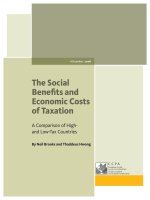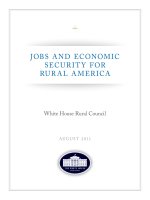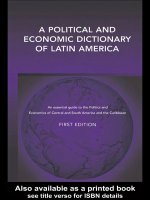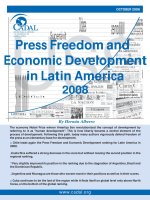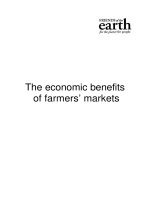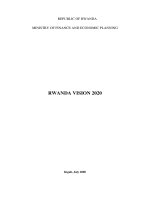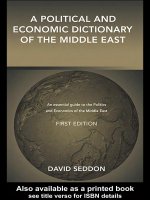A POLITICAL AND ECONOMIC DICTIONARY OF LATIN AMERICA ppt
Bạn đang xem bản rút gọn của tài liệu. Xem và tải ngay bản đầy đủ của tài liệu tại đây (1.62 MB, 315 trang )
A POLITICAL AND ECONOMIC
DICTIONARY OF LATIN AMERICA
A POLITICAL AND ECONOMIC
DICTIONARY OF LATIN
AMERICA
Peter Calvert
FIRST EDITION
LONDON AND NEW YORK
First Edition 2004 Europa Publications 11 New Fetter Lane, London EC4P 4EE, England (A
member of the Taylor & Francis Group)
This edition published in the Taylor & Francis e-Library, 2005.
“To purchase your own copy of this or any of Taylor & Francis
or Routledge’s collection of thousands of eBooks please go to
© Peter Calvert 2004
All rights reserved. No part of this publication may be photocopied, recorded, or otherwise
reproduced, stored in a retrieval system or transmitted in any form or by any electronic or
mechanical means without the prior permission of the copyright owner.
ISBN 0-203-40378-9 Master e-book ISBN
ISBN 0-203-41027-0 (Adobe e-Reader Format)
ISBN 1 85743 211 8 (Print Edition)
Development Editor: Cathy Hartley
Copy Editor and Proof-reader: Simon Chapman
The publishers make no representation, express or implied, with regard to the accuracy of the
information contained in this book and cannot accept any legal responsibility for any errors or
omissions that may take place.
FOREWORD
Latin America, in the first decade of the 21st century, remains as exciting, interesting and
unpredictable as ever. In 2004 Haiti, the first Latin American country to gain its
independence, celebrated its second centenary. But although the structure and
organization of government, politics, production, international relations and trade in the
region are by now well established, important changes are under way, and the Latin
American countries are becoming more important than ever before in world politics as a
bridge between the USA and the rest of the world. This Political and Economic
Dictionary of Latin America seeks to provide an overview of the region based on the
most up-to-date information available at the time of writing.
Latin America, for the purposes of this book, encompasses all of the countries in the
Americas South of the Rio Grande/Río Bravo, which separates the USA from Mexico,
and includes the Greater and Lesser Antilles.
Entries in the dictionary are designed to stand on their own in providing definitions
and essential facts, with coverage of recent developments, and, wherever possible, full
contact details. The broad scope of the dictionary ranges over political groups (both legal
and illegal), institutions, main government leaders and prominent individuals, trade
unions, financial and trade bodies, ethnic groups, countries, territories and principal
cities, as well as essential terms and concepts. Cross-referencing between entries is
indicated by the simple and widely familiar device of using a bold typeface for those
words or entities which have their own coverage. The longest individual entries in the
book are those for the region’s individual countries and territories, giving a succinct
description and historical survey to place recent events in context. For all but the smallest
economies, the country entry is followed by a separate entry on that country’s economy,
again combining up-to-date basic data with a short overview and a focus on recent issues
and developments.
I am most grateful to Matthew Beech for the help he has given me on this project.
Chandlers Ford, April 2004
THE AUTHOR
Peter Calvert is Emeritus Professor of Comparative and International Politics at the
University of Southampton. He has written on Latin American politics, comparative
politics in the third world, and environmental politics. His most recent publications
include: Peter Calvert and Susan Calvert, Politics and Society in the Third World, 2nd
edition (2001), Peter Calvert, Comparative Politics: an Introduction (2002) and Peter
Burnell and Peter Calvert, editors, Civil Society in Democratization (2004).
ABBREVIATIONS
Apdo Apartado (Post Box)
Av., Avda Avenida (Avenue)
Ave Avenue
b. born
Bldg Building
Blvd Boulevard
Capt. Captain
CEO Chief Executive Officer
Chair. Chairman/person/woman
Co Company
Col Colonel
Col. Colima; Colonia
Corpn Corporation
CP Case Postale, Caixa Postal, Casella Postale (Post Box)
DC District of Columbia; Distrito Capital; Distrito Central
DF Distrito Federal
Dir Director
DN Distrito Nacional
Edif. Edificio (Building)
esq esquina (corner)
Exec. Executive
f. founded
FL Florida
Fr Father
Gen. General
GNI Gross National Income
Gov. Governor
ha hectare
Km Kilometre(s)
kph Kilometres per hour
Lic. Licenciado
Lt Lieutenant
Ltd Limited
m metre(s)
m. million
Maj. Major
Man. Manager
MBA Master of Business Administration
Mgr Monseñor
mph miles per hour
No(.) Number; numéro; número
NW North-West
NY New York
OECD Organisation for Economic Co-operation and Development
Of. Oficina (Office)
PO(B) Post Office (Box)
PPP purchasing-power parity
PR Puerto Rico
Pres. President
Prof. Professor
Rd Road
rtd retired
RJ Rio de Janeiro
Sec. Secretary
Sgt Sergeant
SP São Paulo
Sq. Square
St Street; Saint
Sta Santa
UN United Nations
US(A) United States (of America)
INTERNATIONAL TELEPHONE
CODES
The code and relevant telephone number must be preceded by the International Dialling
Code of the country from which you are calling.
Anguilla 1 264
Antigua and Barbuda 1 268
Argentina 54
Aruba 297
Bahamas 1 242
Barbados 1 246
Belize 501
Bermuda 1 441
Bolivia 591
Brazil 55
British Virgin Islands 1 284
Cayman Islands 1 345
Chile 56
Colombia 57
Costa Rica 506
Cuba 53
Dominica 1 767
Dominican Republic 1 809
Ecuador 593
El Salvador 503
Falkland Islands 500
French Guiana 594
Grenada 1 473
Guadeloupe 590
Guatemala 502
Guyana 592
Haiti 509
Honduras 504
Jamaica 1 876
Martinique 596
Mexico 52
Montserrat 1 664
Netherlands Antilles 599
Nicaragua 505
Panama 507
Paraguay 595
Peru 51
Puerto Rico 1 787
Saint Christopher and Nevis 1 869
Saint Lucia 1 758
Saint Vincent and the Grenadines 1 784
Suriname 597
Trinidad and Tobago 1 868
Turks and Caicos Islands 1 649
United States of America 1
United States Virgin Islands 1 340
Uruguay 598
Venezuela 58
A
Acción Democrática (AD)
Democratic Action, Venezuela
Social democratic party. F. 1936 as Partido Democrático Nacional by Rómulo
Betancourt, one of the small group of men exiled by the dictator, Juan Vicente Gómez,
who met at Barranquilla, Colombia, in 1931 to concert opposition to the dictatorship.
Between 1935 and 1937 they tried to put together the nucleus of a Popular Front
government, but in 1937 left-wing activity was banned, and the party suppressed. At the
change of government in 1941 the party obtained legal recognition under its present
name, and in 1945 members played a key role in the junta that overthrew Gen. Isaías
Medina Angarita. In 1948, in the first elections held under the Constitution of 1947, the
AD candidate for President, the novelist and thinker Rómulo Gallegos, was successful
and, though he was deposed a few weeks later, the experience of the trienio was to guide
both Betancourt and the AD when they returned to power after the popular uprising that
overthrew Marcos Pérez Jiménez in 1958. Since that time it has remained the dominant
political party in Venezuela, though eclipsed by the Movimiento V República in 1998.
Leadership: Henry Ramos Allup
Address: Casa Nacional Acción Democrática, Calle Los Cedros, La Florida, Caracas
1050
E-mail:
Internet:
Acción Democrática Nacionalista (ADN)
Nationalist Democratic Action, Bolivia
The ADN was formed as a vehicle for former dictator Gen. (retd) Hugo Bánzer Suárez
(1971–78) for the July 1979 general election, in which he came third with 14.9% of the
vote. In the 1980 general election his share of the vote increased slightly, to 16.9%, and
the ADN won 30 congressional seats, which were finally taken up when Congress was
recalled in September 1982. The ADN initially supported the July 1980 coup led by Gen.
Luis García Meza, but in April 1981 this backing was withdrawn. A month later Bánzer
was arrested on a charge of plotting a counter-coup.
The general election of July 1985 resulted in Bánzer winning the largest share of the
vote (28.6%) in the presidential contest, while the ADN obtained 51 seats in Congress.
However, because no presidential candidate had obtained a clear majority, a centre-left
alliance in Congress elected Víctor Paz Estenssoro of the Movimiento Nacionalista
Revolucionario (MNR) as President. For the May 1989 election the ADN entered into an
alliance with the Partido Demócrata Cristiano. Bánzer, the alliance’s joint candidate, won
22.7% of the vote in the presidential contest and was narrowly outpolled for second place
by the MNR candidate, Gonzalo Sánchez de Lozada. Personal enmity between the two
candidates precluded an ADN-MNR pact and ensured that neither was elected President
by Congress, which opted for Jaime Paz Zamora of the Movimiento de la Izquierda
Revolucionario (MIR). The resultant Acuerdo Patriótico (AP) coalition Government led
by the ADN and the MIR assumed power in August 1989. In return for the presidency,
Jaime Paz Zamora awarded the ADN 10 out of 18 ministerial posts, including the most
important portfolios of finance, defence and foreign affairs. Bánzer personally took the
chairmanship of the Political Council of Convergence and National Unity, a post which
gave him effective control over government policy.
In March 1992 MIR leaders ratified Bánzer as the AP’s 1993 presidential candidate.
However, although the AP secured 43 seats in the Chamber of Deputies and eight in the
Senate, Bánzer himself could only manage second place in the presidential election,
victory going to Sánchez de Lozada of the MNR. The AP was consequently dissolved in
August 1993, with Bánzer resigning as ADN leader in November. In February 1995,
however, Bánzer returned to the leadership of the ADN.
In August 1997 Bánzer again became President, having headed the popular polling in
June with 22.3% of the vote and secured election in a congressional vote with the support
of an ADN-headed ‘mega-coalition’ which included the MIR, Conciencia de Patria and
the Unión Cívica Solidaridad. In the June 1997 congressional election the ADN headed
the poll, winning 33 Chamber seats and 13 in the Senate. The party was therefore
dominant in the resultant coalition Government. In August 2001, announcing that he was
suffering from cancer, Bánzer resigned both the state presidency and the party leadership,
and was succeeded in both positions by Vice-President Jorge Fernando Quiroga Ramírez.
The ADN is an associate member of the International Democrat Union.
Leadership: Jorge Fernando Quiroga Ramírez (leader, former President of the
Republic); Ronald Maclean (2002 presidential candidate)
Address: c/o Cámara de Diputados, La Paz, Bolivia
Internet: www.bolivian.com/adn
A– Z 2
Acción Popular (AP)
Popular Action, Peru
Moderate right-wing party founded by Fernando Belaúnde Terry to contest the
presidential election of 1980, which he won with 44.5% of the votes cast. His
ineffectiveness in combating the threat posed by Sendero Luminoso led to his defeat by
Alan García of the Alianza Popular Revolucionaria Americana in 1985. In the 2001
presidential election the party did not field a candidate and won only three seats in the
Chamber of Deputies.
Leadership: Fernando Belaúnde Terry (Leader), Luis Enrique Gálvez de la Puente
(Sec Gen.)
Address: Paseo Colón 218, Lima 1
Telephone: (1) 332–1965
Fax: (1) 332–1965
E-mail:
Internet:
Acción por la República—Nueva
Dirigencia (AR—ND)
Action for the Republic—New Leadership, Argentina
Right-wing electoral alliance formed in Argentina in 1997 between Acción por la
República and Nueva Dirigencia, the latter a centre-right party founded in 1996 by
dissident Peronist Gustavo Béliz. Obtained nine seats in the Chamber of Deputies at the
mid-term election in 2001.
Leadership: Caro Figueroa (Leader)
E-mail:
Internet:
A– Z 3
Agencia Chile Noticias (ACN)
Chilean News Agency
Leadership: Jeanete Franco N. (Dir)
Address: MacIver 233, Of. 117, Santiago
Telephone: (2) 638–3188
Fax: (2) 638–3188
E-mail:
Internet:
Alexander VI
Rodrigo Borgia or Borja (1432–1503), as Pope Alexander VI (1492–1503), established
the Line of Demarcation between the Spanish and Portuguese territories in the Indies,
which was subsequently fixed at a meridian 370 leagues west of the Cape Verde Islands
by the Treaty of Tordesillas of 1494.
¡Alfaro Vive! ¡Carajo!—see Izquierda
Democrática (ID)
Algemeen Verbond van Vakverenigingen in
Suriname ‘De Moederbond’ (AVVS)
General Confederation of Trade Unions, Suriname
The principal trade union organization in Suriname, with 15,000 members.
Leadership: Imro Grep (Pres.)
Address: Verlengde Coppernamestraat 134, POB 2951, Paramaribo
Telephone: 463501
Fax: 465116
A– Z 4
E-mail:
Alianza por Chile
Alliance for Chile
Right-wing alliance of political parties founded in 1996; originally named the Unión por
Chile (Union for Chile), it adopted its present name in 1999. Its presidential candidate,
Joaquín Lavín, of the Uníon Demócrata Independiente, obtained 47.5% of the first-round
votes in the election of December 1999, but was defeated in the second round.
Leadership: Joaquín Lavín Infante (Leader)
Alianza Democrática-Movimiento 19 de
Abril (AD-M-19)
Democratic Alliance-M-19, Colombia
Alliance of left-wing groups which was formed to support the M-19 campaign for
elections to the National Constituent Assembly in 1990.
Leadership: Diego Montaña Cuéllar (Leader)
Address: Transversal 28, No. 37–38, Santafé de Bogotá, DC
Telephone: (1) 368–9436
E-mail:
Internet:
Alianza Nacional Popular (ANAPO)
National People’s Alliance, Colombia
Right-wing populist political movement founded in 1971 to support the candidature of
former dictator Gustavo Rojas Pinilla; now led by his daughter.
Leadership: María Eugenia Rojas de Moreno Díaz (Leader)
Address: Carrera 18, No. 33–95, Santafé de Bogotá, DC
Telephone: (1) 287–7050
A– Z 5
Fax: (1) 245–3138
Alianza Popular Revolucionaria
Americana (APRA)
American Popular Revolutionary Alliance, Peru
Founded by Víctor Raúl Haya de la Torre in exile in Mexico 1924; established in Peru
as the Partido Aprista Peruano in 1930, but banned in 1932; legalized in 1945 but
repeatedly denied election victory by the armed forces until the election of Alan García as
President in 1985. Democratic, left-wing populist party; claims 700,000 members. In the
2001 presidential election the party’s candidate, Alan García, despite his dismal record as
President, came second to Alejandro Toledo of Perú Posible, with 25.78% of the votes
cast. In the concurrent legislative election APRA emerged as the second largest party,
winning 27 seats in the 120-seat, single-chamber Congress.
Leadership: Alan Gabriel García Pérez
Address: Avda Alfonso Ugarte 1012, Lima 5
Telephone: (1) 428–1736
Internet:
Alianza Republicana Nacionalista
(ARENA)
Nationalist Republican Alliance, El Salvador
Right-wing party founded in 1981 by Maj. Roberto D’Aubuisson to fight terrorism and
resist pressure for change; initially closely linked to ‘death squads’, it contested the
election for the Constituent Assembly in March 1982 with limited success, but in the
election in April 1984 right-wing support coalesced behind d’Aubuisson who obtained
46.4% of the votes cast, compared to 53.6% for the successful Christian Democratic
candidate, José Napoleon Duarte. The election of Alfredo Cristiani in 1989 ushered in a
long period of ARENA dominance.
Leadership: José Salaverria
Address: Prolongación Calle Arce 2423, entre 45 y 47 Avda Norte, San Salvador
Telephone: 260–4400
Fax: 260-5918
A– Z 6
Allende, Salvador
Salvador Allende Gossens, President of Chile in 1970–73, was born in Valparaíso in
1908. The son of a lawyer, he studied medicine and graduated from the University of
Chile in 1932, after a brief interval in which he had been excluded from the University
for political activity. Being known as a relative by marriage of Marmaduque Grove, he
was arrested after the fall of the Socialist Republic, but was finally acquitted of all
charges. In 1933 he was a founder member of the Partido Socialista de Chile, of which
he became secretary-general in 1943. Elected a deputy in 1937, he helped organize the
presidential campaign of Pedro Aguirre Cerda, who appointed him Minister of Health, in
which post he established both health insurance and compensation for victims of
industrial accidents. In 1945 he was elected for the first time to the Senate, where he
remained until 1970, being re-elected on three occasions. However, in his first campaign
for the presidency in 1952 he obtained only 6% of the votes cast. In 1958 he won 29%
and in 1964 39%, but it was only in 1970, when he obtained 36.2%, that he was elected
as President as the candidate of the Unidad Popular coalition. According to custom, the
Chilean Congress agreed to confirm his election, but only after he had undertaken to
respect the Constitution. Despite this, he immediately launched a far-reaching programme
of social reform, including nationalization of the copper mines and other strategically
important industries, and a programme of land reform, which, however, soon got out of
control as the country became increasing polarized. Although his coalition gained support
at the congressional elections, on 11 September 1973 he was overthrown in a military
coup led by Gen. Augusto Pinochet Ugarte. After the air force had bombed La Moneda,
the presidential palace, and had set it on fire, Allende ensured that his supporters left the
building safely and then shot himself.
Alliance for Progress
Alianza para el Progreso
Programme of economic aid for Latin America launched in 1961 by the (John F.)
Kennedy Administration in the USA, intended to counter the influence of Fidel Castro’s
Cuba. The Declaration of the Peoples of America and the Charter of Punta del Este,
which established the alliance, were formally adopted by the Economic and Social
Council of the Organization of American States on 17 August 1961. The US
Government was committed to funding about one-half of the US $20,000m. over 10
years that was to be devoted to long-range development plans submitted by member
states, with emphasis on land reform and land-tax changes. Political changes, however,
meant that few governments availed themselves of this funding, and after 1963 the
impact of the programme gradually fell away.
A– Z 7
Alliance of Small Island States (AOSIS)
Ad hoc intergovernmental grouping founded in 1990 to defend the interests of small
island states and low-lying coastal developing states. Forty-three states (not all of them
islands) are members, of which the following are in the Caribbean area: Antigua and
Barbuda, the Bahamas, Barbados, Belize, Cuba, Dominica, Grenada, Guyana, Haiti,
Jamaica, St Christopher and Nevis, St Lucia, St Vincent and the Grenadines, and
Trinidad and Tobago. Observer states in the region are: Netherlands Antilles, and the US
Virgin Islands.
Leadership: Jagdish Koonjul, Mauritius (Chair.)
Address: c/o 800 Second Ave, Suite 400d, New York, NY 10017, USA
Telephone: (212) 599–6196
Fax: (212) 599–0797
E-mail:
Internet: www.sidsnet.org/aosis
Alternativa por la República de Iguales
(ARI)
Alternative for a Republic of Equals, Argentina
The centre-right ARI was established in April 1997 by Domingo Cavallo, the former
economy minister (1991–96) who had been responsible for the successful Convertibility
Plan, as a vehicle to support his bid for a congressional seat in the October 1997
legislative election and for a possible candidacy in the 1999 presidential election. In the
1997 election the party secured three seats. In the presidential election of 1999 Cavallo
secured 10.1% of the popular vote, while in the simultaneous legislative election the ARI
increased its representation from nine seats to 12. Cavallo joined the Alianza government
as economy minister in March 2001, but was unable to repeat his former success and was
forced to flee on the resignation of President de la Rúa in December 2001. In the 2001
mid-term election ARI had won one seat in the Senate and increased its representation to
17 in the Chamber of Deputies.
Leadership: Armando Caro Figueroa (Chair., Exec. Cttee); José Luis Fernández
Valoni (Sec Gen.); Domingo Cavallo (1999 presidential candidate); Alfredo José
Castañón (congressional Pres.)
Address: Congreso de la Nación, 1835–1849 Buenos Aires 1089, Argentina
Telephone: (11) 4954–5541/4842
E-mail:
Internet: www1.hcdn.gov.ar/dependencias/ari
A– Z 8
Amazon Co-operation Treaty
Tratado de Cooperación Amazónica
The Treaty for Amazon Co-operation was signed in Brasília, Brazil, on 3 July 1978 by
the foreign ministers of Bolivia, Brazil, Colombia, Ecuador, Guyana, Peru, Suriname and
Venezuela. The object of the Treaty was to promote the harmonious development of the
Amazon territories of the eight signatory states by joint efforts towards their common
benefit; to protect the environment; to preserve and make rational use of natural
resources; and to maintain full freedom of commercial navigation on the Amazon and
other international rivers of the region as guaranteed by each signatory. Owing to the vast
size of the region and the mutual suspicions of the countries involved, the agreement has
had very little effect, although by entering into closer ties with Guyana, Brazil effectively
checked Venezuela’s ambitions to annex the Essequibo region and began the process of
opening up direct road links to the Guyanan capital of Georgetown. In December 1995
the foreign ministers of the member states agreed to establish a regional secretariat in
Brasília and signed the Lima Declaration on sustainable development.
Andean Community of Nations
Comunidad Andina de Naciones (CAN)
The Andean Pact, Andean Group (Grupo Andino) or Acuerdo de Cartagena, was the first
major subregional organization in the hemisphere. The Group took its customary Spanish
name from the Treaty of Cartagena, originally known as the Andean Subregional
Integration Agreement, signed at Cartagena de Indias, Colombia, by Bolivia, Chile,
Colombia, Ecuador and Peru on 26 May 1969. In February 1973 Venezuela joined the
organization, but Chile withdrew from it on 21 January 1977, officially because of its
hostility to foreign capital; in reality, because of the other members’ criticism of, and
unwillingness to work with, the dictatorial regime of Gen. Augusto Pinochet Ugarte.
Even after the Mandate of Cartagena of May 1979, which advocated greater political and
economic co-operation, local disputes continued to disrupt the working of the Group.
The purpose of the Andean Group was to promote economic integration between the
member states, by progressive elimination of tariff barriers and the co-ordination of
industrial development. Intra-Group trade grew significantly after its formation. The
supreme authority of the Group was the Commission, made up of one ambassador from
each member state. Foreign ministers met annually or as required to formulate external
policy. The Andean Parliament (Parlamento Andino) of five members from each state
had a purely advisory role, but the Court of Justice, established in 1984, settled disputes
arising under the Treaty.
A– Z 9
The Andean Pact led to the reduction of many tariffs and to some increase in intra-
regional trade. Dissatisfaction with the rate of progress towards integration, however, led
to the decision, taken at a summit meeting held in Cuzco, Peru, on 22–23 May 1990, to
achieve free trade in goods by 1995. At a summit meeting in Venezuela in May 1991
heads of government approved the Declaration of Caracas, committing the five states to a
free-trade zone by January 1992 and reaffirming the goal of a fully integrated common
market by 1995. The military-backed coup in Peru in April 1992, however, threatened to
bring the whole process of integration to a halt when Peru withdrew temporarily from the
Pact. Nevertheless, in March 1993 the other four member states agreed to establish a
customs union. In October tariffs were abolished altogether between Bolivia, Colombia
and Ecuador. Peru subsequently rejoined the Pact, though it did not take part in
negotiations leading to the creation of the unified market on 1 January 1995, and was not
due to participate in the free-trade zone until mid-1996.
In March 1996 an agreement was signed, in Trujillo, Peru, to restructure the Pact into
an Andean Community of Nations, thus strengthening regional integration. However,
after the recurrence of border conflict with Ecuador, in April 1997 Peru announced its
intention to withdraw from the Community and was not represented at the summit
meeting held in Sucre, Ecuador, in that month. In the late 1990s, with Venezuela in
economic crisis and Colombia affected by civil war, the Andean Community lost
momentum. Two of its members, Chile and Bolivia, began to seek other ties and, in May
1999, the decision by the new Venezuelan Government of Lt-Col Hugo Chávez Frías to
close Venezuela’s frontier to Colombian long-haul lorries for one year was a clear breach
of community rules.
Leadership: Guillermo Fernández de Soto (Colombia: Sec Gen.)
Address: Paseo de la República 3895, eq. Aramburú, San Isidro, Lima, Peru
Telephone: (511) 411–1400
Fax: (511) 221–33–29
E-mail:
Internet:
Andean Development Corporation
Corporación Andina de Fomento (CAF)
The Andean Development Corporation, with headquarters in Caracas, Venezuela, was
formed in 1968 to act as the development-financing arm of the Andean Group, mainly for
industrial development and for the creation of basic services. The principal shareholders
in the CAF are the members of the Andean Community of Nations: Bolivia, Colombia,
Ecuador, Peru and Venezuela. There are in addition 11 regional partner shareholder
countries. It defines its mission as being to promote the sustainable development of its
shareholder countries and regional integration and it provides funding to both public and
private sectors. In 2000 disbursements totalled over US $1,800m., of which 72% was
A– Z 10
directed to public-sector projects. In March 2002 the Andean Presidents agreed to
increase the authorized share capital of the CAF from $3,000m. to $5,000m.
Officer: Enrique García Rodríguez (Exec. Pres.)
Address: Torre CAF, Avda Luis Roche, Altamira, Apdo 5086, Caracas, Venezuela
Telephone: (12) 209–2111
Fax: (12) 209–2444
E-mail:
Internet:
Andean Pact—see Andean Community of
Nations
Anguilla
An Overseas Territory of the United Kingdom, one of the most northerly of the Leeward
Islands in the Lesser Antilles, Anguilla is the smallest island territory in the Caribbean.
The main island, named by the French for its resemblance to an eel (anguille), is 91sq km
in area and the smaller island of Sombrero 5sq km.
Area overall: 96sq km; capital: The Valley; population: 12,446 (July 2002 estimate);
official language: English.
Constitution: Under the British Overseas Territories Act of 2002, the Governor both
represents the Crown and presides over the Executive Council and the House of
Assembly. He himself is responsible for defence, external relations, the public service,
the judiciary and the audit. The Executive Council consists of the Chief Minister and not
more than three other ministers appointed by the Governor from the elected members of
the House of Assembly, as well as two members ex officio, the Deputy Governor and the
Attorney-General. The House of Assembly is elected for a maximum term of five years
by universal adult suffrage, and consists of seven elected members, the two ex-officio
members and two nominated members.
History: Anguilla was first settled by English settlers in 1650. In 1825 it was attached for
administrative purposes to St Christopher (St Kitts) and Nevis. With it, it was part of the
Leeward Islands Federation from 1871 until 1956, when it joined the short-lived West
Indies Federation. When the Federation broke up, the inhabitants refused to return to rule
from St Kitts, and in 1969 a detachment of the British Metropolitan Police was
dispatched to the island to maintain order, though it was not formally constituted as a
separate British Dependent Territory until 1980. The island lies in the main track of the
hurricane belt and was severely damaged by ‘Hurricane Luis’ in 1995.
Latest elections: In the elections of March 2000 the Anguilla National Alliance (ANA)
won three seats and the Anguilla United Party (AUP) two. The Anguilla Democratic
A– Z 11
Party (ADR) retained only one seat and the seventh seat went to an independent.
Osbourne Fleming of the ANA became Chief Minister in succession to Hubert Hughes of
the AUP, who had served as Chief Minister since 1994, latterly at the head of a coalition
with the ADP.
International relations and defence: The United Kingdom government is responsible for
both.
Economy: The territory has a prosperous middle-income economy, as defined by the
International Bank for Reconstruction and Development (World Bank). Gross
domestic product per head in 2001 was US $11,430. The main source is tourism. There is
a limited amount of commercial fishing.
Antigua and Barbuda
Antigua and Barbuda lie slightly to the east of the main chain of the Leeward Islands,
43km (27 miles) north-east of Montserrat. The third island in the group, Redonda, is
uninhabited.
Area overall: 442sq km (171sq miles); capital: St John’s; population: 77,426 (2001
census), many recent immigrants from Montserrat and the Dominican Republic; official
language: English; religion: mainly Anglican, some Roman Catholic, other Protestant
denominations.
Constitution: Antigua and Barbuda is a constitutional monarchy within the
Commonwealth. The head of state is HM Queen Elizabeth II, who is represented by a
Governor-General of local citizenship. Parliament consists of an appointed Senate of 17
members (at least one from Barbuda) and a 17-member, directly elected House of
Representatives. The Barbuda Council is the local authority for that island.
History: Christopher Columbus landed on the main island and named it Santa María de
la Antigua in 1493, but the first permanent European settlement on the island, in 1632,
was by English settlers. In 1666 the island was briefly captured by France, but soon
relinquished. Sugar cultivation by imported slaves was introduced in 1674, and remained
the principal economic activity even after emancipation in 1834. English Harbour, which
provided excellent shelter, had meanwhile become Britain’s major naval base in the West
Indies.
In 1871 Antigua became the seat of government for Britain’s Leeward Islands
Federation. This was dissolved in 1957 and Antigua and Barbuda, where universal
suffrage had been introduced in 1951, joined the Federation of the West Indies. When it
collapsed, negotiations to federate the smaller states were unsuccessful and in 1967
Antigua and Barbuda became a British Associated Territory, with full internal self-
government under the leadership of Vere C.Bird, Sr, and the Antigua Labour Party
(ALP), which had first come to power in 1950. Full independence was achieved on 1
November 1981, since when the Bird family and the ALP have continued to maintain
tight control of Antiguan politics, aided by the distorting effects of the ‘first-past-the-
post’ electoral system. At the general election held on 9 March 1999, at which Lester
Bird and the ALP were returned to power, the results were: ALP 12 seats (17,417 votes),
A– Z 12
United Progressive Party (UPP) four seats (14,817 votes), Barbuda People’s Movement
one seat (418 votes).
Latest elections: In a general election held on 24 March 2002, the ALP was defeated,
after 53 years in office under successive members of the Bird family. The UPP, led by
Baldwin Spencer, won 14 seats in the House of Representatives and the ALP three seats.
Turn-out at the election, monitored by Commonwealth observers, was 90%.
International relations and defence: Antigua and Barbuda is a member of the United
Nations, the Organization of American States, the Commonwealth, the Caribbean
Community and Common Market and the Organization of Eastern Caribbean
States. The US Government leases two military bases on Antigua, which participates in
the US-sponsored Regional Security System. It has a small defence force of 170 men.
Economy: The islands have a relatively prosperous economy by regional standards. With
gross domestic product (GDP) per head of US $9,055 in 2001, Antigua and Barbuda
ranked as a middle-income country. However, though the economy grew at an average
rate of 5.3% in 1996–99, the rate fell to 2.5% in 2000, 1.5% in 2001 and 1.2% in 2002.
This was largely as a result of stagnation in the country’s chief industry, tourism, revenue
from which was insufficient to cover the trade deficit. The government has maintained a
deficit for many years, with the result that total external debt was equivalent to 79.6% of
GDP in 2001. According to a March 2004 US State Department report, the island is of
‘primary concern’ for money-laundering and is an important transhipment point for South
American cocaine.
Arias Sánchez, Oscar
Oscar Arias Sánchez, b. 1941, President of Costa Rica in 1986–90, was the youngest
President in the country’s history. He had studied abroad, at the London School of
Economics and Political Science, before taking an active role in the Partido de
Liberación Nacional. As President, he took a lead in persuading his fellow Central
Americans to take matters into their own hands and discuss a peace plan, known as the
Arias Plan, to end conflict and foreign intervention in Central America. Although any
peace agreement that did not result in the fall of the Sandinista Government in Nicaragua
was strongly opposed by the Reagan Administration in the USA, with support from
Mexico, Colombia, Venezuela and Panama, the Arias Plan eventually led to the
Esquipulas II agreement, and Arias was awarded the Nobel Peace Prize for his work.
A– Z 13


